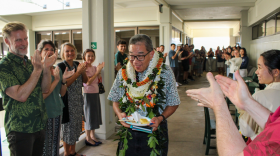It’s been a busy time at the International Space Station. Three astronauts arrived at the facility Monday morning. Last Thursday, NASA and SpaceX successfully launched a spacecraft carrying cargo for the ISS, including a satellite led by the University of Hawaiʻi at Mānoa.
The hyperthermal spectral imager, or HyTI, will measure heat from the earth and provide data about events like volcanic eruptions and wildfires. It will be deployed from the space station in May.

Hawaiʻi Institute of Geophysics and Planetology Director Robert Wright and several UH students who worked on the project just returned from a trip to the Kennedy Space Center in Florida to watch the rocket launch. They've been working on the project for the last five years.
"The launch was spectacular. The weather was perfect, no clouds at all," Wright said. "One of the surprising things is when the rocket goes off, you don't hear any noise for a period of time because you're so far away. It takes time for the sound to travel to you. So even though the rocket is lifting off from the ground, it's several seconds before you actually hear the roar of the engine."
The satellite project received funding from NASA's In-Space Validation of Earth Science Technologies Program.
"NASA likes to develop new technologies, and then space-qualify them," he said. "And then once you've proven that they can work in space, then those technologies become eligible for incorporation into future, more expensive missions."
The HyTI satellite is owned by NASA and will operated by the Hawaiʻi Space Flight Laboratory. After the satellite is deployed from the ISS, it must wait 30 minutes before turning on to avoid interfering with astronauts and the ISS.
"At that point, we'll start checking out the different spacecraft systems to make out it's healthy, and that's going to take about six weeks. And then once we've done all that, and we have full control of the spacecraft, then we can start acquiring science data and making science measurements," Wright told HPR.
This story aired on <i>The Conversation</i> on March 25, 2024. The Conversation airs weekdays at 11 a.m. on HPR-1.





